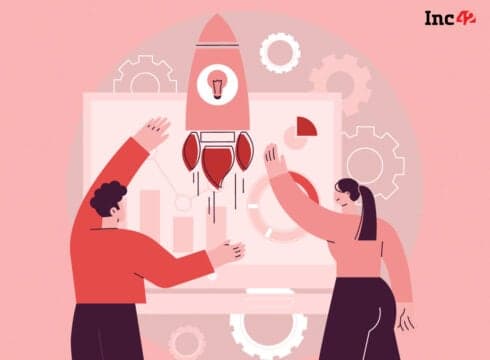Venture Studios bring structural certainty and repeatability to venture creation
They identify opportunities or problems, develop solutions along with founders, launch new companies, and provide them extensive operational and strategic support until the companies achieve PMF
Studios are slightly better placed to understand markets and design exhaustive solutions as they learn from documented mistakes
Inc42 Daily Brief
Stay Ahead With Daily News & Analysis on India’s Tech & Startup Economy
If venture creation is a two-stop journey, then product-market fit (PMF) is the first stop, and unlocking scale and value for customers and shareholders is the destination.
Today, we’ll focus on the first one as it is more immediate and relevant in a new start-up’s journey. PMF is a much-used, quite-misused term that declares a solution has “arrived,” and reaching PMF means coming together multiple variables:
PMF = function (market, idea, team, execution)
In the current economic climate, startup founders need to be laser-focused on getting to PMF in the most capital-efficient manner. Venture studios can help founders reach PMF faster and cheaper than the status quo. This is possible due to their institutional knowledge or ‘playbooks,’ experienced internal teams that have successfully guided multiple companies to PMF, and access to sector specialists, advisors, potential buyers, and partner organizations.
Before we dive into the ‘how’, let’s get the definition of a venture studio out of the way.
“A Venture Studio is an organisation that identifies opportunities or problems, develops solutions along with founders, launches new companies, and provides them extensive operational and strategic support until the companies achieve product-market fit.”
As a process, this is what they do from ideation to execution:
To better understand how these stages work, let’s take a closer look at them through a few examples.
Part 1: Ideation
An analysis of 100+ failed startups reported that 42% attributed their failure to misunderstanding market need, 17% attributed it to poor product solutioning and another 17% confessed to not having a successful business model. A startup founder needs to know all the pitfalls in advance and then know how to solve them. Studios are slightly better placed to understand markets and design exhaustive solutions as they learn from documented mistakes. Following is the step-by-step process in the first leg of company creation:
- Market research: Venture studios conduct detailed market research to identify a large unsolved pain point faced by consumers (for example, by patients, doctors, hospitals, or other stakeholders). The Studio then builds a view on a 10x better solution – leveraging insights from business and physician leaders, patients, published research, and global trends. Each short-listed concept goes through a stringent validation process involving hundreds of conversations with doctors and patients, clinical studies, and go-to-market experiments to arrive at a prioritized solution. Typically, 90% of ideas are killed ‘with conviction’ before a single dollar of equity funding is deployed. The goal is to look for large, untapped opportunities where a disruptive solution can be built in a capital-efficient manner.
- Talent identification: At this stage, a venture studio brings on board passionate founders with 0-1 and scale experience for the specific idea under consideration. The founders (or Entrepreneurs-in-residence) further validate the concept and build a business and operating plan.
- Independent validation: Advisory board and network of experts help verify the concept and business plan. Studios also conduct mass surveys, observational studies, and social media experiments to gather opinions and learn from them.
Part 2: Execution
Ideas are a dime a dozen, but an idea is only as good as the execution. The transformative idea and experienced founders need to be super-charged with capital, resources, and tools to boost the chances of success. Next steps in nurturing start-ups:
- Investment: Next, studios fund companies in two ways:
-
- Provide capital for the first 12-18 months of operations for newly incubated companies based on:
- Nature of business (care delivery intensive vs D2C products vs SaaS – all have different cost structures)
- Estimated timeline to prove MVP success at a unit level (e.g., for a clinic it could be the number of patients for breakeven)
- Human capital through a large team of in-house experts across multiple business functions. Early-stage start-ups can’t afford senior, experienced executives. For functions like marketing or product, these create fundamental set-up mistakes that can be harder to undo or redo. Studios solve this by bringing the best talent to the start-up on day 0.
- Provide capital for the first 12-18 months of operations for newly incubated companies based on:
- Studio support through Playbooks: Usually, Studios build three types of ‘playbooks’ that form their institutional knowledge or IP:
- Functional playbooks: These deal with functional skills like marketing, product, talent, and legal. Central studio teams build these with experience over time, perfecting it to the granular detail. Help new companies already be smart about questions like – how to get to the first 1000 paid customers; best practices for building the best customer onboarding experience.
- Strategy playbooks: Outside siloed business functions lie more significant strategic and multifunctional questions about decision-making in given constraints and timelines. When to hire senior leadership? When to launch a new city? When to pivot? – these questions are well-built within the Studio’s collective intelligence.
- Innovation playbooks: This encompasses multiple daily, tactical improvements like automation, experiments, tinkering, etc., for internal and external tasks that keep the innovation quotient high. These include scrappy web-scraping code snippets, Excel macro workbooks, and even large institutional mental models for determining the R&D budget, starting new revenue lines, and defining mandates for new EIRs.
In summary, Venture Studios bring structural certainty and repeatability to venture creation. The step-by-step process will change, evolve, and improve with time, but what will remain constant is the continuous endeavor to maximise the chances of success while optimising for time, cost, and resources. And then do this not once, but again and again.
{{#name}}{{name}}{{/name}}{{^name}}-{{/name}}
{{#description}}{{description}}...{{/description}}{{^description}}-{{/description}}
Note: We at Inc42 take our ethics very seriously. More information about it can be found here.


